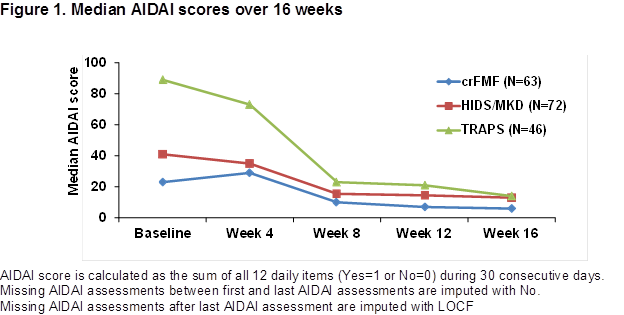Session Information
Date: Sunday, November 5, 2017
Session Type: ACR Poster Session A
Session Time: 9:00AM-11:00AM
Background/Purpose: AIDAI is a novel, validated tool for the assessment of disease activity across a wide spectrum of autoinflammatory diseases including recurrent fever syndromes such as familial Mediterranean fever (FMF), hyper-IgD syndrome/mevalonate kinase deficiency (HIDS/MKD) and TNF receptor-associated periodic syndrome (TRAPS).1 Canakinumab (CAN), a fully human anti-interleukin-1β monoclonal antibody, has demonstrated efficacy in resolving flares and preventing new flares in RFS patients (pts) through CLUSTER study (NCT02059291).2 Here we evaluate AIDAI scores over 16 weeks (wks) of CAN treatment in pts from CLUSTER study and assess correlation between AIDAI and disease/response characteristics.
Methods: CLUSTER study consisted of 3 cohorts (crFMF, HIDS/MKD and TRAPS).2 AIDAI was calculated as the sum of 12 items (Yes=1 or No=0)1 for 30 consecutive days. AIDAI score was calculated if the first score was recorded before ≥29 days. Missing AIDAI scores between first and last assessments were imputed with ‘No’. Missing items beyond last evaluable measurement were imputed by last observation carried forward (LOCF). Proportion of pts with inactive disease (ID; AIDAI score <9) was calculated at Wk 16. Correlation analysis of AIDAI with C-reactive protein (CRP), serum amyloid A (SAA), physician global assessment (PGA), Sheehan disability score (SDS), child health questionnaire–psychological/physical (CHQ–PsCS/PCS) and short form 12–physical/mental component summaries (SF12–PCS/MCS) were performed at baseline and Wk 16, with significance set at p<0.05.
Results: Overall, 181 (crFMF, N=63; HIDS/MKD, N=72; TRAPS, N=46) pts were randomized to CAN 150 mg or placebo every 4 wks. Median AIDAI scores in all 3 cohorts decreased from baseline to Wk 16 (Figure 1). The proportion of pts with ID at Wk 16 was 52% in crFMF, 40% in HIDS/MKD and 46% in TRAPS cohort. AIDAI at Wk 16 correlated significantly with: SDS in all 3 cohorts; PGA in HIDS/MKD and TRAPS; SF12–MCS in crFMF and HIDS/MKD (Table 1). CRP and SAA did not correlate with AIDAI.
Conclusion: Decrease in AIDAI scores over 16 weeks in crFMF, HIDS/MKD and TRAPS patients treated with canakinumab corroborates rapid and sustained disease control with canakinumab in CLUSTER study. At Week 16, approximately half of the crFMF and TRAPS patients, and 40% of the HIDS/MKD patients had inactive disease. AIDAI improvements at Week 16 correlated with patient and physician driven evaluations (PGA, SF12–MCS and SDS). CRP and SAA are indicators of response to treatment rather than a disease activity parameter.
1Piram M, et al. Ann Rheum Dis. 2014;73:2168-73.
2De Benedetti F, et al. Ann Rheum Dis. 2016;75:615-6.
|
Table 1. Correlation between AIDAI and disease activity/response variables at Week 16 |
|||
|
|
Correlation coefficient (95% CI) |
||
|
crFMF N=63 |
HIDS/MKD N=72 |
TRAPS N=46 |
|
|
CRP |
-0.12 (-0.36; 0.14) |
0.23 (-0.01; 0.45) |
0.12 (-0.19; 0.42) |
|
SAA |
-0.01 (-0.27; 0.25) |
-0.05 (-0.30; 0.21) |
0.06 (-0.26; 0.37) |
|
PGA |
0.23 (-0.02; 0.46) |
0.35§ (0.12; 0.55) |
0.73* (-0.54; 0.85) |
|
CHQ–PsCS |
-0.18 (-0.56; 0.26) |
-0.25 (-0.55; 0.11) |
-0.33 (-0.72; 0.22) |
|
CHQ–PCS |
-0.33 (-0.66; 0.11) |
-0.46§ (-0.70; -0.14) |
-0.48 (-0.80; 0.04) |
|
SF12–PCS |
-0.26 (-0.57; 0.11) |
-0.23 (-0.68; 0.35) |
-0.52‡ (-0.81; -0.03) |
|
SF12–MCS |
-0.45‡ (-0.70; -0.10) |
-0.55‡ (-0.84; -0.03) |
0.09 (-0.43; 0.56) |
|
SDS |
0.47† (0.22; 0.67) |
0.37§ (0.10; 0.59) |
0.41‡ (0.06; 0.67) |
|
*p<0.0001; †p<0.001; §p<0.01; ‡p<0.05 |
|||
To cite this abstract in AMA style:
Koné-Paut I, Hofer M, Benseler S, Kuemmerle-Deschner JB, Jansson A, Rosner I, Manna R, Murias S, Karadag O, Tucker L, Orban I, Tormey V, Alessio M, Ozdogan H, De Benedetti F. Improvement of Disease Activity in Patients with Colchicine-Resistant FMF, Hids/Mkd and TRAPS Assessed By Autoinflammatory Disease Activity Index (AIDAI): Results from a Randomized Phase III Trial [abstract]. Arthritis Rheumatol. 2017; 69 (suppl 10). https://acrabstracts.org/abstract/improvement-of-disease-activity-in-patients-with-colchicine-resistant-fmf-hidsmkd-and-traps-assessed-by-autoinflammatory-disease-activity-index-aidai-results-from-a-randomized-phase-iii-trial/. Accessed .« Back to 2017 ACR/ARHP Annual Meeting
ACR Meeting Abstracts - https://acrabstracts.org/abstract/improvement-of-disease-activity-in-patients-with-colchicine-resistant-fmf-hidsmkd-and-traps-assessed-by-autoinflammatory-disease-activity-index-aidai-results-from-a-randomized-phase-iii-trial/

